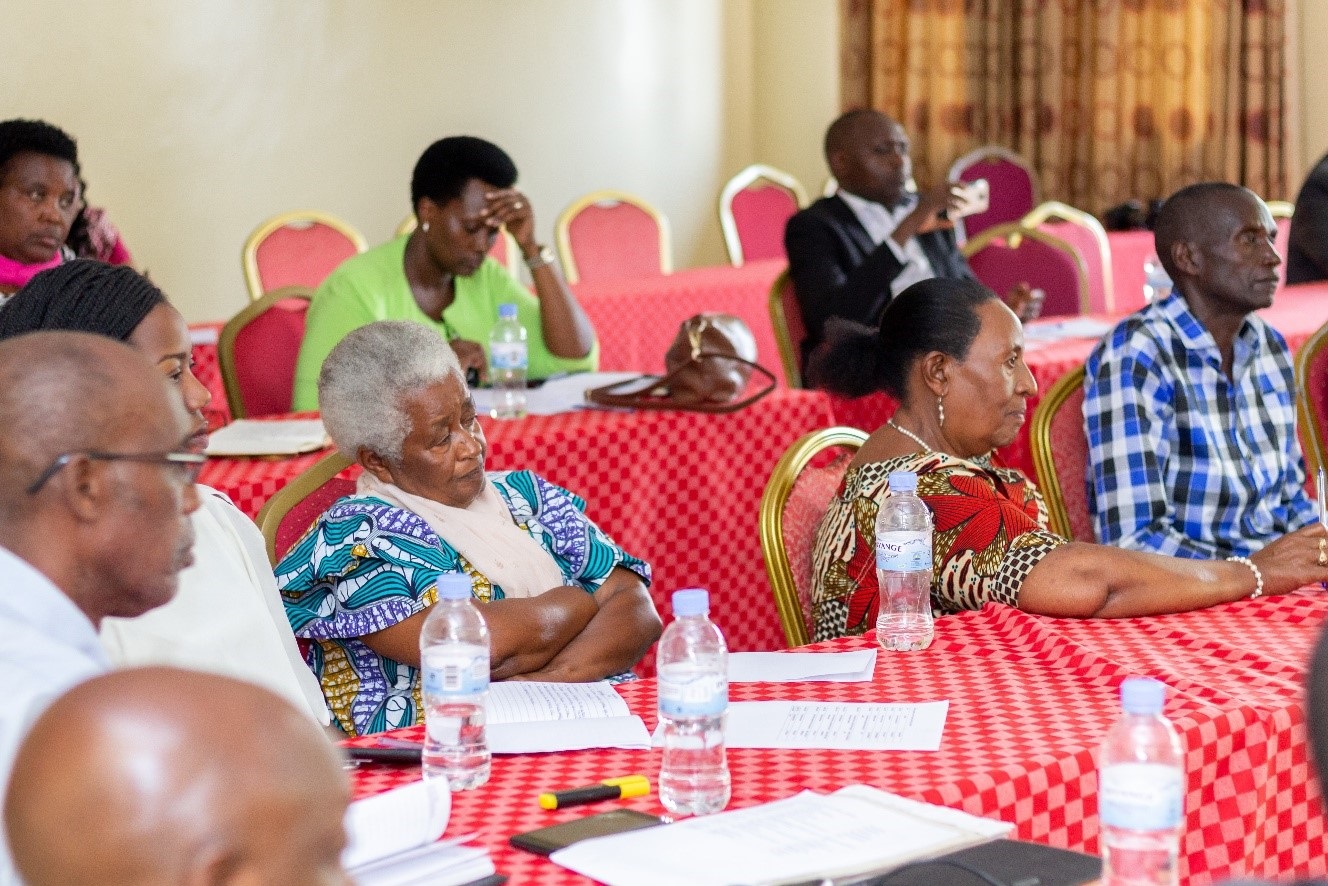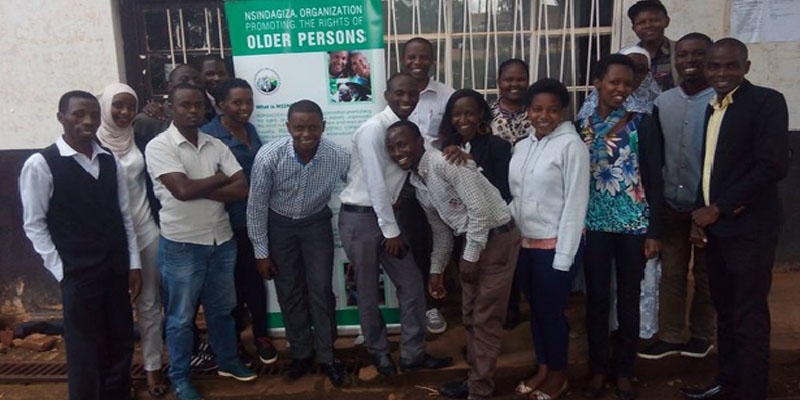Category: Reports
Key highlights from the commemoration of the International day of older people 2018 in Rwanda
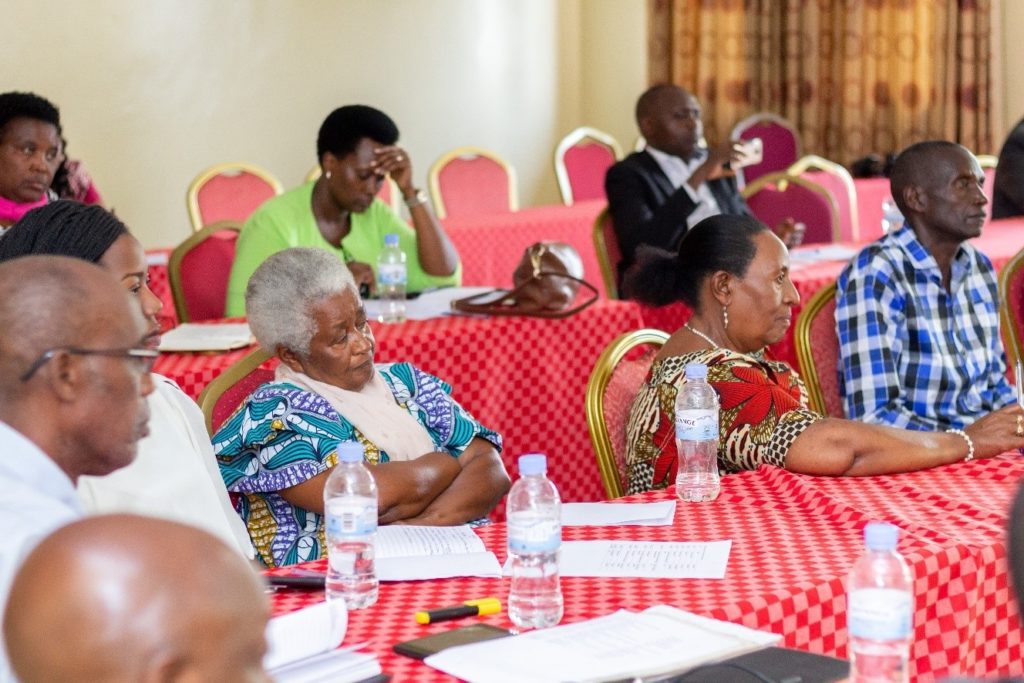
NSINDAGIZA Organization is committed to promote the rights and welfare of older people, through advocacy and community awareness campaigns, targeting older people’s families, community members, civil society and Government officials. This year’s global theme was “Recognizing older campaigners”, in Rwanda it was “Self-reliance for everyone: Foundation for ageing with dignity”. We applaud the effort made by the Government of Rwanda to make successful this year’s IDOP at all levels. Below are key highlights from the International Day of Older Persons:
- The IDOP 2018 was commemorated countrywide and the high level officials mobilized by the Ministry of Local Government and Social Protection. Awareness was increased at district level with a strong involvement of older people, two meetings set up prior to the IDOP, with relevant officials to discuss the national elderly policy.
- Tripartite meeting that brought together Government institutions (MINALOC, MINIJUST, MINAFFET, REAF, RSSB…), civil society and the National commission for Human Rights. Older people were given the opportunity to share their feelings and views on what the Universal Declaration of Human Rights means for them and NSINDAGIZA shared the outcomes from the UN Open-Ended Working Group on Ageing and encouraged the Government of Rwanda and the National Commission for Human Rights to join others in advocating for the UN Convention on the rights of older people. The meeting served as a platform for older people to share their views.
- Other actors organized IDOP 2018 related events including Humanity and Inclusion (former Handicap International) in Mahama refugee camp, in collaboration with Caritas Rwanda, Rwanda Red Cross and Save the Children. Presbyterian Church in some parishes, and individuals organized home visits and support to the elderly in their community.
- Strong partnership with the National Commission of Human Rights during the organization and implementation of the IDOP 2018
- Strong media engagement, where older people were called to talk on different radio stations about the ageing issues and older people were requested to advise the community on how to sustain cultural values. Different radios and magazines were interested to talk about ageing issues and the community was given the opportunity to share their concerns.
Recommendations from the workshop on long-term care, palliative care, autonomy and independence, may 24, 2018
NSINDAGIZA Organization, considering the integration of the elderly in the implementation of the SDGs, organized on May 24, 2018 a high level workshop on long-term care, palliative care, autonomy and independence for older persons. The workshop was organized in collaboration with the Rwanda Bio-medical center, National Commission of Human Rights, with the support of MINALOC and HelpAge International, and different actors in palliative care, human rights institutes, Government and Civil Society attended the workshop and the MINALOC addressed the opening remarks. After the presentation made by NSINDAGIZA Organization, RBC, SDGC/Africa and the National Commission of Human Rights, the participants agreed on the following recommendations:
1. The Government of Rwanda and non-governmental organizations, to include in their programs to educate and give ability to the elderly, so as to help them reduce their pain and that they may be able to age gracefully.
2. RBC/MoH ought to raise community awareness on the existing palliative care to the people and put in consideration the elderly in particular.
3. The Government and non-governmental organizations should conduct the researches on the livelihood of the elderly, so as to promote the rights and welfare of older men and women and create awareness based on evidences.
4. The Ministry of Health to fast-track the in-service training and awareness for health professionals on how to take care of the elderly
5. The Ministry of Health to train specialists in gerontology and geriatric and establish geriatric services in all public hospitals and clinics
6. The Government of Rwanda to comply with the international and regional instruments/measures/mechanisms related to the rights of older persons and plan to attend annual meeting of the UN Open-Ended Working Group on Ageing (OEWG) that should be attended by the Government, the National Commission of Human Rights and the elderly representatives
7. The Government of Rwanda to fast-track signing and ratification of the African charter on the rights of the elderly (2016), putting in action the Madrid Plan of Action on ageing (2002) and to submit the due reports concerning the above.
8. The MINALOC to speed up the national elderly policy, and advocate for the mainstreaming ageing among all the sectoral policies, such as MoH, MIDIMAR, MINAGRI, MIGEPROF, SDGs implementation…
9. Civil Society and Private Sector to put into consideration the elderly in all their programs.
10. Put in place policies that will enable the older men and women of the society to take decisions on their own and be able to participate in programs to build the family and the country as a whole
11. The Government of Rwanda and civil society to increase community awareness on the violence against the older men and women and to celebrate the World Elder Abuse Day, every June 15th
12. Non-governmental organizations to work hand in hand with the Government in the celebration of the International Day of Older Persons, October 1st.
13. Put in place policies to make known the Law of the responsibilities of children towards their parents and the consequences of failing to do so.
Kigali, May 24, 2018
Elie MUGABOWISHEMA, President of NSINDAGIZA
Ageing Demands: Older persons claim specific care, activists on policy gap, Government finds no gap
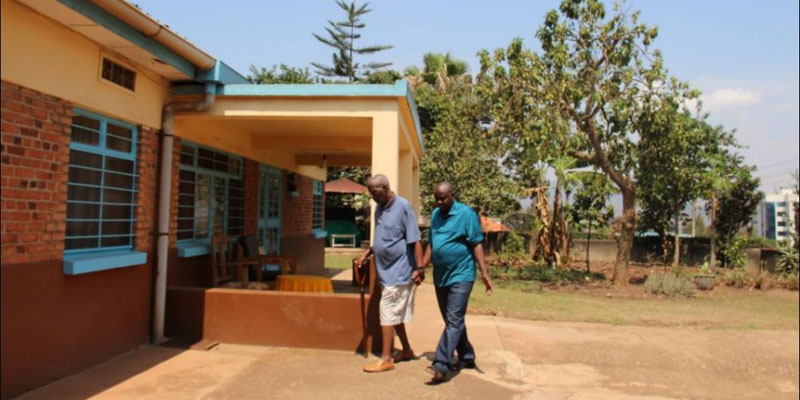
“I am tired now, you have made me talk for long and it is good for me but I am tired. I like having someone attending to me for a talk as I usually spend entire day alone.”
Retired Pastor Naasson Hitimana.
Activists advocate for particular policies
Well over 10 years through Age Demand Action (ADA), rights activists have advocated for international convention on the rights of older persons, participation of older persons in governments’ decisions that affect them and having choice about their lives in their respective families.
There is still a lack of international convention and local policies about the rights and welfare of older persons.We are urging the Government of Rwanda to set up particular platforms through which older persons can channel their concerns as children, youth, women and people with disabilities have theirs.
Most of older persons suffer serious depression and stigma resulting from isolation and creating space for them to participate in the country and family’s life would be the best solution as well as developing effective social protection schemes for older persons.
Madeleine Nirere, the Chairperson of National Commission for Human Rights, Told igihe.com that after the recent outreach in which the commission learnt about lack of proper protection of older persons, the commission recommends government to develop a policy on eldercare and support existing charitable centres for older persons.
She added that considering the frailty of older persons, they deserve special care, saying that Rwanda should ratify and implement obligations in international and regional instruments on older persons’ rights and protection.
Ms Nirere stressed that older persons’ close and extended family members, neighbours, close government entities and Rwandan society at large should take responsibility of eldercare.
Minister of State in charge of Social Affairs and Social Protection at the Ministry of Local Government,Dr Alvera Mukabaramba,Told igihe.com that government does its best to support all vulnerable people and older persons constitute the majority of beneficiaries of social protection schemes such as cash transfer under Vision 2020 Umurenge Programme (VUP) and Community-Based Health Insurance (Mutuelle de Santé).
“Not all elderly persons need support. Some are receiving their pension while others have children or other family members supporting them. We are working on a comprehensive social protection policy considering together all categories of the disadvantaged as the current policy will expire in 2018,”
Dr Alvera Mukabaramba said.
Dr Mukabaramba urged young people to save for their old age, saying that every working Rwandan, not only monthly salary earners but also informal sector actors including those on government support schemes, has to save for pension as a sustainable solution for ageing demands.
“Government seeks to strengthen pension scheme and poor people who will join the scheme will receive government’s incentives according to law which is now in Parliament. Meanwhile, children should not forsake their old parents and government will intervene where necessary,”
Dr Alvera Mukabaramba said.
Report on the volunteers training
UNIVERSITY OF RWANDA VOLUNTEERS OF NSINDAGIZA ORGANIZATION WORKSHOP REPORT
CENTER FOR MENTAL HEALTH HUYE CAMPUS

INTRODUCTION
NSINDAGIZA Organization in collaboration with Center for Mental Health, organized the workshop held on 1st May 2017 in Huye at the Center for Mental Health. The workshop was attended by 21 participants (14 Males and 7 Females). .
I. OBJECTIVES OF THE WORKSHOP
- To raise awareness of the UR students on the situation of elderly persons at different levels
- To explain the organization and its mission
- To explain the operation of the support groups
- To establish a club of volunteers in Huye
II. PARTICIPANTS
- UR students, volunteers of NSINDAGIZA
- HABARUGIRA Augustin, Center for Mental Health delegate
- IZATURWANAHO Félicien ,President of Clinical psychology Students Association of Rwanda (CPSAR)
- Elie MUGABOWISHEMA, President of NSINDAGIZA Organization
- Félicien MULINDA, President of NSINDAGIZA Huye
- MUKARURINDA Zaïnabu, President of Ngoma support group
- Gisèle BANKUNDIYE, Board member
III. WELCOME REMARKS
In his opening remarks Mr. HABARUGIRA Augustin, representing the Center for Mental Health, on behalf of the center, applauded NSINDAGIZA organization and its volunteers who participated in the workshop for raising their voices and joining their hands in promoting the rights and welfare of the elderly persons in Rwanda and beyond. He ensured the collaboration and full support of the center to the organization.
IV. TOPICS DISCUSSED
I. Elderly overview
In his presentation, Mr. Fulgence MUNYAMPETA, one of the UR students in clinical psychology and intern in Center for Mental Health, showed clearly the statistics of elderly situation globally and in Rwanda.
According to his presentation, in 2050 the older person will be triple to about 1.5 billion representing 16 percent of the world population (WHO, 2012).
In Rwanda, according to the RPHC4, there are 511,738 elderly persons (60 and above) living in Rwanda out of a total population of 10,515,973 inhabitants. The elderly thus represent 4.9% of the total resident population.
Data from the four Rwandan censuses indicate that the proportion of old people first increased from 4.8% in 1978 to 5% in 1991 dropped again slightly to 4.3% in 2002 and has only minimally increased to 4.9% in 2012.
Therefore, He concluded by saying that the increase in the number of old people requires the programs and measures of assisting them in their long journey in old age.
II. Organization and its mission
Elie MUGABOWISHEMA, the Founder and President of NSINDAGIZA Organization, explained the mission and vision of the organization.
He said that after observing the problems and challenges older persons face (loneliness, Chronicle illnesses including NCDs and, HIV/AIDS, poverty, psychological problems,) he met with other few people to discuss what to do with older persons. The first General Assembly, held on 20th July 2014, initiated the Organization named “NSINDAGIZA” in Kigali Sector, NYARUGENGE District with 31 members and the committee of 7 members was put in place, with an objective of Promoting the rights and welfare of the most vulnerable older persons in Rwanda. Elie emphasized clearly the role and responsibilities, the qualities and the benefits for the volunteer and shared the power point presentation containing all related information. He concluded by calling upon the volunteers to join hands for the advocacy of elderly persons in Rwanda and beyond, and invest their time, talents and treasures in the promotion of elderly persons through sensitization of the community and capacity building of elderly persons.
III. Volunteerism
Gisele BANKUNDIYE, one of board members on her side, emphasized the terms volunteering (Gukorera ubushake) and to be committed (Gukorana ubushake) and the benefits of both. From different views from the participants, volunteering is to work without any material compensation whereas to be committed refers to work with willingness, strength and courage. Although there is no tangible compensation, there is internal motivation from working with the older persons because it is always helpful to realize the results of your effort. She shared her experience working as a volunteer from 2014, including fundraising for the activities related to the promotion of the rights and welfare of elderly persons, and she concluded by saying that it is not a shame nor a loss to invest in the improvement of the lives of the elderly.
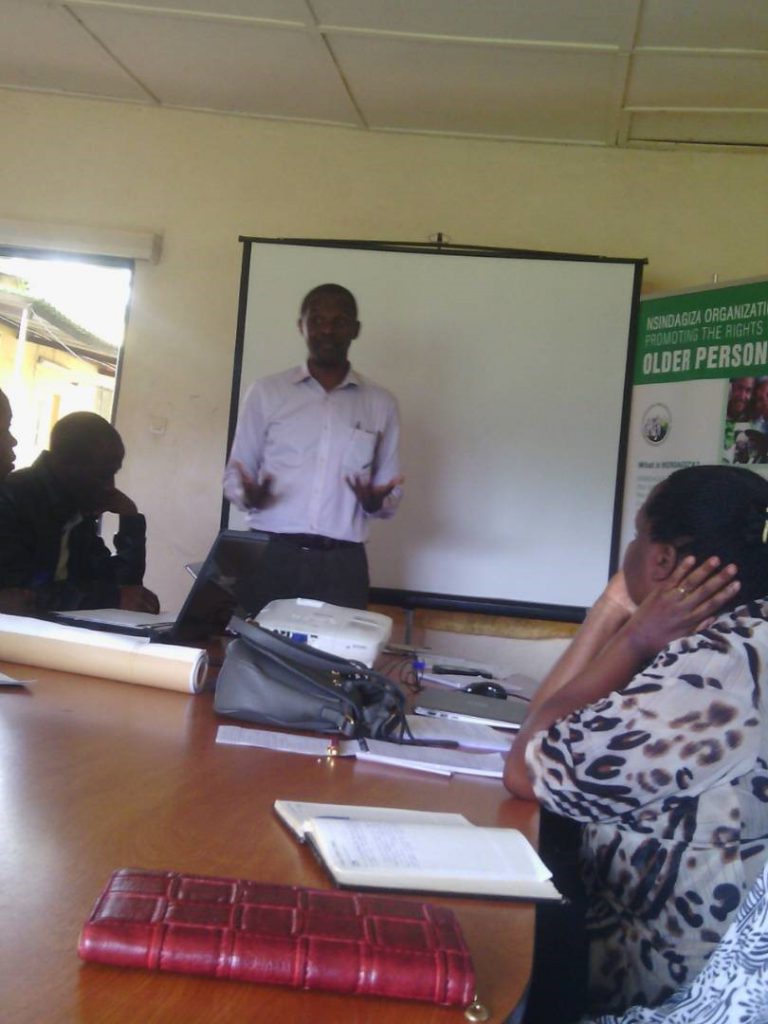

Mr.KABALISA Arsene, Executive Secretary of Ngoma Sector in his welcome remarks.
IV. Working in groups
Felicien MULINDA, the President of NSINDAGIZA in Huye district, shared his experience of how after he met with Elie, he came and started to mobilize some key people in Huye and formed a local committee which is not fully functional as he immediately got an accident and was not able to sustain the team. Fortunately, he had at that time shared the idea with some older women in Ngoma Sector, who started a support group which is fully functional. He expressed his joy at seeing the commitment of the support group members and how the group is growing up, with the support of local leaders including the Vice Mayor in charge of social affairs.
After his speech, Mr Felicien handed over to Zaïnabu MUKARURINDA, the President of the support group- who shared her experience on how to be together as the old people changed their lives. They are 26 members (old women) who meet every Thursday to share their feelings and the effects of aging. In order to be able to help each other by solving some financial issues, they decided to contribute 200frw/week for gathering their capacity and self-sustainability. They opened a bank account in SACCO and they use the money to help whichever member could meet a problem. She concluded by saying that this group helped them overcome the loneliness, anxiety of their future lives, depression and some other social problems.
V. WORKSHOP OUTCOME
From the different opinions of greatly pleasured participants, they thanked the leadership of NSINDAGIZA Organization for thinking about them and helping them to understand how elderly persons could be assisted in their long aging journey and how they could be assisted to overcome the problems and challenges they face in their daily lives.
Pre-test and Post-test
Prior to the workshop, the participants did a test to evaluate their level of understanding the concept of aging in the beginning and did the same test at the end to evaluate the outputs of the workshop.
Therefore, in comparison to both tests, there was a big difference between the initial and end results. The participants increased knowledge on who is elderly, their challenges, how they should be assisted and how they could be involved in that process, they discovered the international, regional and national materials, they discovered the gap existing in Rwanda and also understood how the elderly person should be assisted in and the areas they need the assistance and support. (Biologically, psychologically and socially).
The question that had the same result in both tests is what asked whether there are documents they know about old people. All of them answered that there are no written documents about old people they knew.
2. Topic discussed outcome
The participants courageously agreed to be the volunteers, sustain the group, to be the agents of change in society by organizing the community awareness campaigns to improve the lives of elderly persons and advocate for them. As university students, they decided to use different measures in advocacy including:
- Educating the community on how to sustain the lives of elderly persons in their neighborhoods,
- Formalizing the UR students NSINDAGIZA club in Huye campus and creating others in other campuses as well as in neighboring high schools,
- Using ICT and social media to widely spread the advocating messages for the rights and welfare of elderly persons,
- Conducting researches on the situation of elderly persons in Rwanda and encouraging the graduates to consider elderly situations in their dissertations,
- Supporting their respective communities to create elderly support groups and youth NSINDAGIZA youth clubs,
- To be involved in the organization of key social events in Huye, such as; the International Day of Older Persons on October 1st, HIV and AIDS on December 1st, health campaign in the first week of April and campaign on rights on June 15th.
- Keep supporting the existing elderly support group in Huye and create other in Ngoma Sector.
3. UR NSINDAGIZA Group Committee
The participants committed to join hands in advocating and raising awareness through different actions, and decided to elect their committee as follow:
No | NAMES | POST | CONTACTS |
1 | Julienne MUKABAHIZI | President | 0781119408 |
2 | NTWALI léo Charté | V/President | 0784000559 |
3 | MUHORAKEYE Oliviette | Treasurer Secretary | 0783933070 |
4 | MUNYAMPETA Fulgence | 1st Advisor | 0782225940 |
5 | KANEZA Mariam Nadia | 2nd Advisor | 0728363022 |
Felicien IZATURWANAHO, president of clinical psychology students Association of Rwanda in his speech thanked the organization and committed to keep supporting the team and providing any support in his competencies.
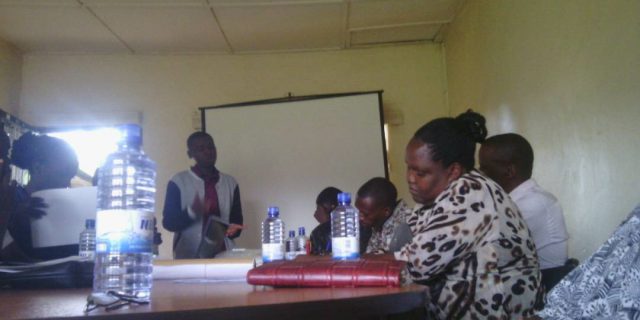
Finally, the President of the organization, Elie MUGABOWISHEMA, thanked the participants for their opinions, ideas, commitment and promised them his full support and collaboration in all activities promoting the rights and welfare of the most vulnerable elderly persons in Rwanda.
